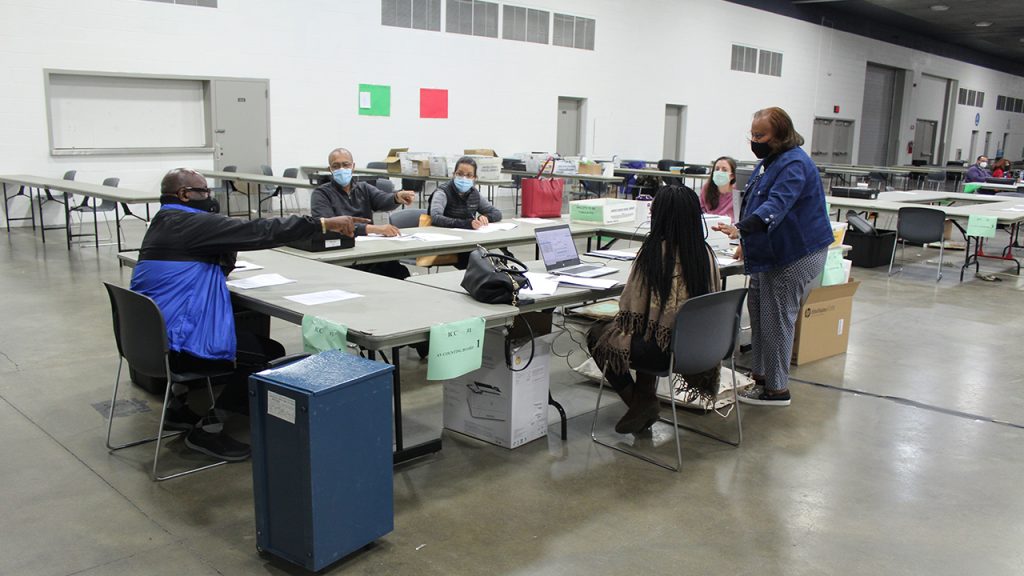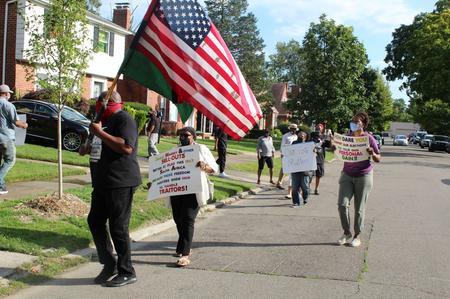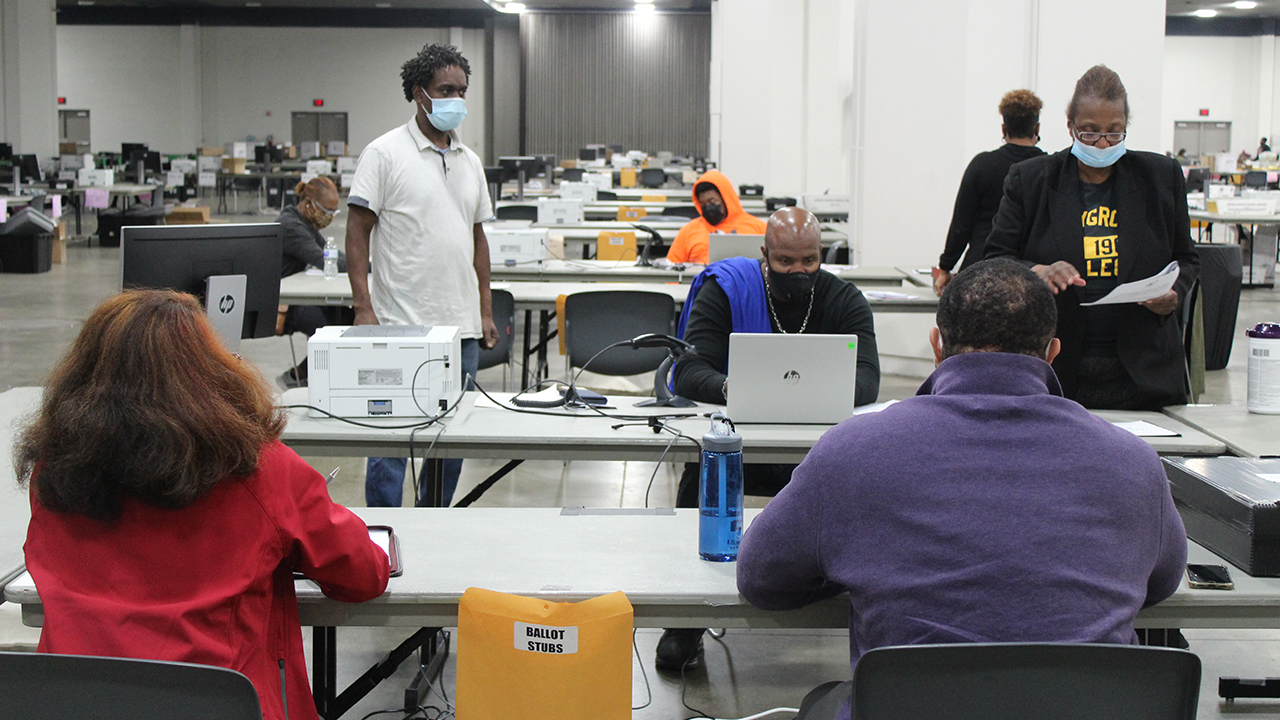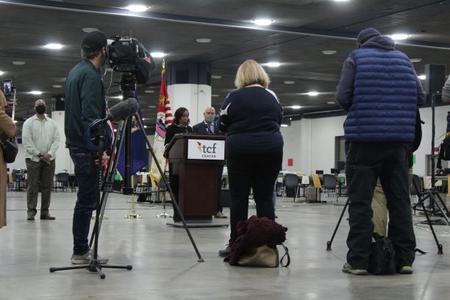Detroit Election Officials Take Steps to Resolve Issues that Plagued the Primary
In August, 72% of the city’s absentee ballot precincts were out of balance, making them ineligible to be recounted. Election officials are taking steps to ensure that does not happen in the presidential election.

Between staffing shortages, inadequate training for volunteers, and mistakes that affected the ability for votes to be recounted, Detroit’s August primary election did not go smoothly. There’s a lot at stake for the entire country in Tuesday’s general election, and city and state election officials are taking steps to ensure the same errors aren’t being made on November 3rd.
Click on the audio player above to hear about what happened in Detroit’s August Primary, and what’s been done to fix it.
The main job of the Wayne County Board of Canvassers is to examine and certify election results that come from Detroit and the other municipalities in the county. Monica Palmer, a Republican and the chair of the bipartisan board, says when the group received unofficial primary election results from Michigan’s largest city, there were a lot of mistakes.
“We found that the absentee ballots, the majority of those precincts were out of balance, unexplained,” says Palmer.
72% of the precincts came back this way. A precinct is considered unbalanced when the number of votes counted does not align with the number of ballots cast and the number of votes recorded.
“And when that happens that precinct is not available to be recounted if there’s a recount… And that disenfranchises voters,” says Palmer.
It’s important to note that if absentee ballots for a specific precinct are unbalanced, those ballots are the only ones unable to be recounted, not the votes that were conducted in person at a polling precinct. In addition, if there’s a recount, even votes from unbalanced precincts are included in the tally, but they can’t be double-checked for accuracy so what was counted in those precincts on election night stands.

That’s a big deal when you’re a candidate hoping a recount will turn up a few more votes in your favor. This was the case for Brenda Hill, a candidate in the August Primary running to represent State House District 10, which spans Redford and part of the northwestern tip of Detroit.
“I was declared the winner of the election. At three o’clock on the next day after the election, absentee votes came out of the blue and the person that was in a distant third is now the supposed winner in District 10,” explains Hill.
Absentee ballots take longer to count and so it’s plausible a late-arriving batch just happened to favor Hill’s opponent. Hill wanted to double check what occurred, so she filed for a recount. But she couldn’t have the district fully recounted because a portion of the Detroit precincts were unbalanced without explanation. Hill filed a lawsuit against Detroit City Clerk Janice Winfrey that has not yet been ruled on.
“And when that happens that precinct is not available to be recounted if there’s a recount… And that disenfranchises voters”
Imagine if what happened to Hill happens to a presidential candidate in the November election. It has happened before.
In 2016, Green Party candidate Jill Stein asked for a recount in Michigan. Shortly after the process began, and before it was even completed, officials discovered that 20% of Detroit’s precincts were out of balance and could not legally be retallied. The Michigan Bureau of Elections launched a statewide audit since issues were found in other parts of the state as well. In Detroit, the Bureau found precincts were unbalanced, ballots were not properly stored in lock boxes and more. The Bureau recommended that the city implement better training, recruit more workers, and test supervisory staff on their election knowledge. Despite these and other recommendations, four years later, there are still some unresolved issues.
So what happened in August?
A ‘Perfect Storm’
“We had our own perfect storm, if you will,” says Daniel Baxter, a special projects consultant with the Detroit Department of Elections. He formerly served as the department’s director. Baxter attributes a lot of the primary election issues to the pandemic.
“With COVID-19, a lot of organizations had the stay at home order. The department got a late start in terms of preparing for the election. They had a late start in recruiting poll workers. Many of our poll workers, who are seniors, didn’t want to come out during the primary election and as such, we had a deficit in staffing,” says Baxter.
“I felt like I was really leaning on that manual and really working on the fly and doing what I thought was the right thing to do. And in essence, I did a good job, but it wasn’t without challenge.” Donna Murray-Brown, volunteer poll worker
Many of the people who did show up had never worked an election before. Donna Murray-Brown, President and CEO of the Michigan Nonprofit Association, is one of the people who decided to step up during the primary election and become a poll worker. Murray-Brown says she didn’t feel completely prepared after the training, so she held her manual close. When she showed up to work on Election Day, she found out that due to staffing shortages, she had to take on additional roles that she wasn’t trained to do.
“I felt like I was really leaning on that manual and really working on the fly and doing what I thought was the right thing to do. And in essence, I did a good job, but it wasn’t without challenge,” says Murray-Brown.
Besides inadequate training for election workers, the large influx of absentee ballots also contributed to the chaos of the August primary. The city had never before processed so many mail-in ballots. Detroit City Clerk Janice Winfrey explained at a news conference that new workers only received an hour of training, which left them feeling under-prepared and frustrated.
“At about eight o’clock when the polls closed, they walked off. They quit. They left the work undone,” says Winfrey.
The staff that remained, Winfrey says, had to scramble to wrap up the process to the best of their ability.
Preparing for November
With so many unbalanced precincts discovered after the primary, the Wayne County Board of Canvassers and the Michigan Board of Canvassers asked the state to intervene in Detroit’s November election. In September, the Michigan Secretary of State’s office announced a partnership with the city. The state said it would review training materials and help to recruit at least 6,000 election workers for Detroit. The state accomplished its goal and Winfrey said, five days before the November election, the city had trained more than 7,000 workers.
“We’ve done several test timings to make sure that we can meet the standard in terms of accuracy and efficiency.” Daniel Baxter, Detroit Department of Elections consultant
Dr. Holly Gilmer is one of the new recruits. She’s taking time off from her job as a surgeon to help with the election. Gilmer will supervise a table of absentee ballot counters. She says it’s an intricate process with a lot of contingency plans.

“Ideally, you would be doing this over a period of time with someone proctoring you. But here we just have to have a crash course and learn it. And so I think that’s why we had to have the four training sessions,” says Gilmer.
Training for absentee ballot counting supervisors includes four sessions, each about 2.5 hours, which consists of a mix of lectures and hands-on learning. Gilmer says if supervisors like her run into any issues while working their shifts, they can request assistance from team leaders who are above them.
“We’ve done several test timings to make sure that we can meet the standard in terms of accuracy and efficiency,” says Daniel Baxter, the consultant with the Detroit Department of Elections.
He says the department has worked to address the problems that happened in August.
“I want to ensure every Detroiter who votes by absentee ballot for the November 3rd [election] that their ballot will be counted. And in the event that a recount occurs, Detroit will be in great shape,” says Baxter.
But Monica Palmer of the Wayne County Board of Canvassers, says she isn’t so sure that Detroit will be in great shape, should a recount occur.
“I know November 4, when we start the canvass if the absentee ballots are counted by then, that we have 14 days to review what happened. And I’m terrified that we’re going to have the same problem all over again,” says Palmer.
But there is one thing Palmer feels pretty confident about. “If it comes down to Michigan being in play and there’s a recount, all eyes are going to be on the city of Detroit for this.”
Palmer says she really hopes this time everything goes smoothly so that every single vote will not only be counted but that it will be eligible to be counted again.

Trusted, accurate, up-to-date
WDET is here to keep you informed on essential information, news and resources related to COVID-19.
This is a stressful, insecure time for many. So it’s more important than ever for you, our listeners and readers, who are able to donate to keep supporting WDET’s mission. Please make a gift today.
